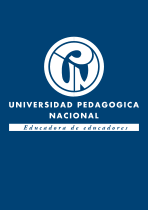Llamado a una función ética y política del docente en la educación virtual.

Citación
Fecha
2015-10-08Autor
Salcedo Valderrama, Karen Marcela
Vargas Herrera, Loren Katerine
Enlace al recurso
http://revistas.pedagogica.edu.co/index.php/FHP/article/view/3290Palabras claves
Educación virtual
Función docente
Ciencias sociales
Educación
Preparación docente
Formación ética y política
Vínculo educativo
Relación social
Función instructiva
Función formativa
Keyword
Virtual educationTeacher role
Ethical and political formation
Educational link
Social relationships
Instructional function
Formative function
Metadatos
Mostrar el registro completo del ítemResumen
El presente artículo está basado en la investigación cualitativa Análisis de la función del docente y la formación ética y política en las condiciones de la educación virtual. Su propósito es responder si el marco de la educación virtual posibilita la formación ética y política de los sujetos, en la medida en que favorece o no la formación de juicios, la toma de decisiones y la aptitud para vivir en comunidad. Para esto, se tomaron cuatro testimonios correlacionados con un insumo teórico, con la intención de lograr un acercamiento al fenómeno de la educación virtual y comprender así su rápida acogida e implementación en el país. Esta correlación no solo mostrará las diferentes perspectivas que se tienen de esta forma de educación sino que también permitirá reflexionar y precisar ciertas características de la función docente en la formación ética y política.
Abstract
This article is based upon the qualitative research Analy-sis of the Teachers’ Role and Ethical and Political Formation in a Virtual Education Context. It attempts to answer if a virtual education context enables the ethical and politi-cal formation of subjects, in terms of favoring judgment, decision making, and the ability to live in community. In order to achieve this goal, four testimonies were corre-lated with a theoretical framework to approach virtual education and understand its fast reception and imple-mentation in the country. This correlation will not only show different perspectives of virtual education, but it will also allow us to reflect upon and pin down some fea-tures of teachers’ role in ethical and political formation.
Editorial
Editorial Universidad Pedagógica Nacional
